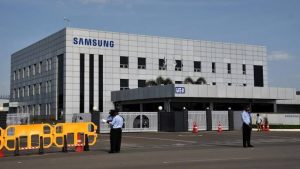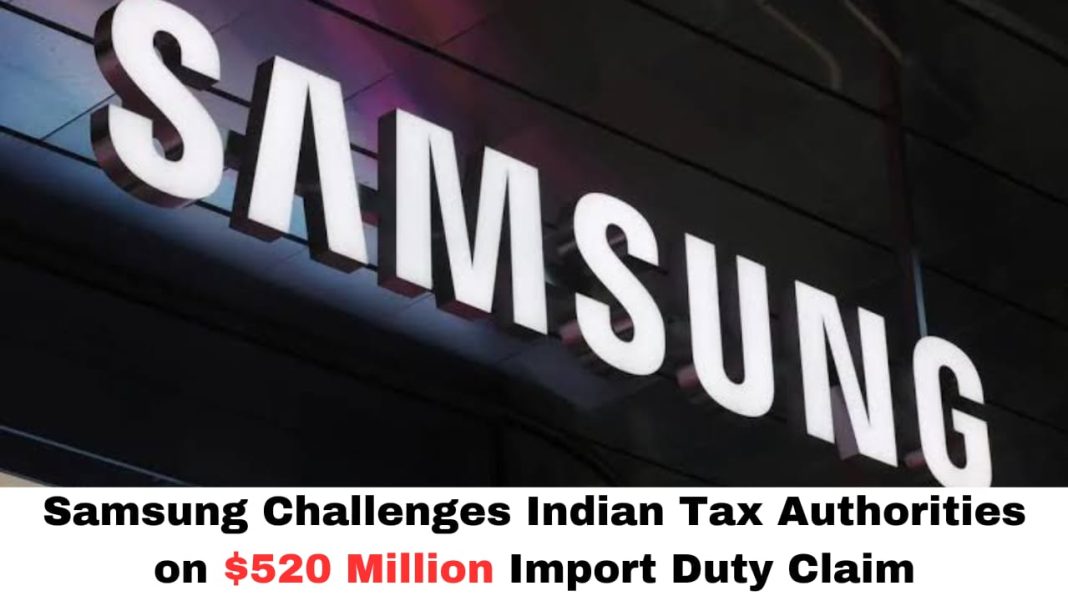Digital News Guru National Desk:
Samsung Battles $520 Million Tax Demand in India Over Telecom Imports
Samsung Electronics is embroiled in a significant tax dispute with Indian authorities, facing a demand of $601 million (approximately 5,000 crore) over alleged misclassification of imported telecom equipment. The case centers on the importation of Remote Radio Head (RRH) units between 2018 and 2021, which Samsung reportedly declared as ‘parts’ to benefit from lower or zero customs duties. Indian customs officials contend that RRHs are complete devices integral to 4G telecom infrastructure and should have attracted tariffs ranging from 10% to 20%.
Background of the Dispute
Samsung’s Indian subsidiary, Samsung India Electronics Ltd. (SIEL), imported RRH units worth approximately $784 million from Korea and Vietnam during the specified period. These components were supplied to Reliance Jio, a major telecom operator in India.

The Directorate of Revenue Intelligence (DRI) initiated an investigation in 2021, conducting searches at Samsung’s offices in Mumbai and Gurugram, seizing documents, and questioning top executives.
The DRI alleges that Samsung deliberately misclassified RRHs to evade applicable customs duties. In January 2025, the agency issued a show-cause notice demanding $520 million in unpaid taxes and an additional $81 million in penalties against seven senior executives, including the company’s Network Division Vice President and Chief Financial Officer.
Samsung’s Defense
Samsung has contested the allegations, asserting that the classification of RRHs as ‘parts’ was consistent with industry practices and previously accepted by Indian customs authorities. The company filed a 281-page appeal with the Customs Excise and Service Tax Appellate Tribunal (CESTAT) in Mumbai, arguing that the classification method was known to officials, as Reliance Jio had imported similar equipment under the same classification until 2017.
Furthermore, Samsung claims that it was unaware of a 2017 warning issued to Reliance regarding the classification and that tax officials did not raise concerns during the years in question. The company also alleges that the tax order was hastily passed, denying it a fair opportunity to present its case.
Expert Opinions and Contradictions
To support its position, Samsung obtained four expert opinions stating that RRHs do not function as transceivers and, therefore, should not attract the higher tariffs applicable to complete telecom equipment.

However, tax officials countered this argument by citing letters from 2020 in which Samsung allegedly described RRHs as transceivers capable of transmitting signals, thereby justifying the higher duty classification.
Broader Implications
This dispute is part of a broader pattern of increased scrutiny by Indian authorities on the import practices of multinational corporations. Volkswagen, for instance, is currently challenging a $1.4 billion tax demand over similar issues related to the misclassification of imported car parts.
The outcome of Samsung’s case could have significant implications for foreign businesses operating in India, particularly concerning the classification of imported goods and the application of tariffs. It also raises questions about the consistency and transparency of India’s tax regime, which could impact the country’s attractiveness as an investment destination.
Conclusion
Samsung’s legal battle over the $601 million tax demand underscores the complexities of international trade regulations and the importance of clear communication between corporations and regulatory authorities. As the case unfolds, it will be closely watched by industry stakeholders and could set precedents for how similar disputes are handled in the future.

Samsung Electronics is contesting a $520 million tax demand from Indian authorities, alleging misclassification of imported telecom equipment. The dispute centers on the import of Remote Radio Head (RRH) units—key components in 4G infrastructure—between 2018 and 2021. Indian tax officials claim Samsung misclassified these imports to evade 10–20% tariffs, amounting to $520 million in unpaid duties. Additionally, seven Samsung employees face personal fines totaling $81 million, bringing the total demand to $601 million.
You May Also Read: Amaravati to Host India’s First Transmedia Entertainment City: ‘Creatorland’ Unveiled, Promises 25,000 Jobs, 10,000 Crore Investment








